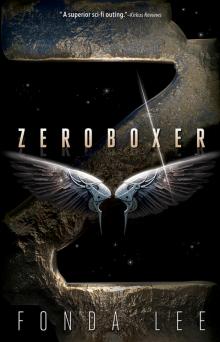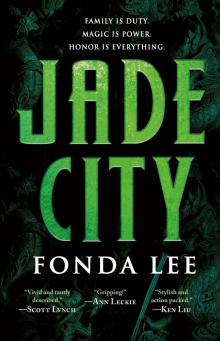CROSS FIRE Read online
Page 4
“We questioned her twice,” Donovan reminded him. “She says she hasn’t had any contact with him for years. She’s an exo, her file’s clean as a whistle, and she’s engaged to be remarried to someone in her same erze.”
“Yeah, I know,” Jet said doubtfully. “But she and Nakada had a kid and went through a tragedy together. That’s got to stay with her. There’s a good chance she still cares about him and is secretly helping him to evade capture.”
“She’s an administrator-in-erze,” Donovan pointed out. “How would she have access to information about SecPac operations to tip him off?”
“Maybe someone in SecPac is helping her.”
“So now we’re looking for two traitors, from two different erze?”
“I don’t know yet, all right?” Jet replied, frustrated. “I just think we haven’t dug into Nakada’s connections enough. He used to be marked and he had a life in the Round. People don’t just leave their past behind that easily.”
That was true. Donovan got up and stretched, giving up on his reading for the night. “You’re right. We should bring it up with Commander Tate. She’s probably already—”
There was a knock on the front door. Jet and Donovan both looked at it in surprise. Jet shrugged. When Donovan went to the entrance and opened it, he found a stout woman in a tan blazer, black skirt, and Administrator erze markings standing on the front step.
“Donovan Reyes?” she said.
“Yeah,” Donovan replied.
“I’m here regarding the execution of a will in which you are the named beneficiary.”
Donovan frowned in confusion. “My father’s will was executed months ago. Someone came and walked me through it already.”
“This isn’t in regard to your father’s will,” the woman replied. “You’re the legal recipient of certain possessions that belonged to the late Dr. Vincent Ghosh.”
Dr. Ghosh? The scientist-in-erze who’d recently been gunned down? The one in the photograph with his father, whose award-winning research had been stolen by Sapience? “I never knew Dr. Ghosh,” Donovan said, utterly perplexed now. “There has to be a mistake.”
“I’ll explain the circumstances,” said the woman. “May I come in?”
Donovan held the door open and the woman entered. She walked into the kitchen with Donovan and Jet following, set a handbag down on the table, and drew a sealed, padded envelope from the inside of her bag, along with a screen, which she tapped while speaking to Donovan. “Dr. Ghosh specified that in the event of his death, the contents of his personal safe box were to be removed and delivered directly to Prime Liaison Dominick Reyes. Unfortunately, his instructions were not updated to reflect the fact that the original named beneficiary is also now deceased. As you are the legal heir to Dominick Reyes, the item in question now belongs to you.” She handed the screen to Donovan. “Please sign here.”
Curious as well as bewildered, Donovan signed, and the woman handed him the envelope. It was not large—about the size of a deck of cards, sealed with packing tape and unmarked. “Have a nice evening,” said the administrator-in-erze. Jet opened the door for her to leave as Donovan turned the object over in his hands. Digging under the packing tape with a bladed index finger, he sliced the envelope open. Inside was a small box containing several data storage discs.
“What are they?” Jet asked.
“Beats me.” The discs were labeled Data Set 1, Data Set 2, Data Set 3, Models, Summary of Results. Donovan went back to the living room and found his screen stashed under the coffee table. He inserted one of the discs—Data Set 1—into the device’s read slot. A long list of file icons filled his screen. Opening one at random, he saw dozens more icons, which, when opened, turned out to be black-and-white medical images. “I think these are brains,” Donovan said. “Lots of brains.”
Jet came and looked over his shoulder. The images had labels and notes, all of it indecipherable medical gobbledygook. “Seems like the doctor saved a copy of his work,” Jet said. “Maybe he wanted to be sure his research wasn’t lost if Sapience got to him.”
“But why send this to my dad?” Donovan wondered. “You’d think it ought to go to his colleagues in the Scientist erze.”
“It could be that he wanted your dad to know exactly what the sapes were after.” Jet squinted at the screen. “I wonder if there’s information in here that Sapience gave to Nakada to help him make the weapon they want. Could give us clues as to what he’s up to now.”
“Good point.” Donovan kept scrolling.
Jet glanced at the clock on the wall. “Vic’s going to wonder what on earth happened to me.” He shifted from foot to foot, reluctant yet anxious to leave. “I’ll be back in a couple hours.”
Donovan nodded and waved his partner off distractedly. When Jet left the house, Donovan sat back down on the sofa, still perusing Ghosh’s files. He found the stark images weirdly mesmerizing; it was strange to think that there was a real person behind each black-and-white walnut shape on the screen. Several minutes later, he’d managed to figure out from the tiny labels that most of the brain scans were from exos of varying age and gender. HRD M 39. A thirty-nine-year-old male exo. Another was labeled NHRD F 26. A non-Hardened twenty-six-year-old female. He couldn’t figure out much more. The scans had light and dark spots that appeared to indicate brain activity under certain stimuli, but a person would need a medical degree to know what any of it meant. The images and words began to blur in his vision. Maybe he’d be able to make more sense of them if he hadn’t had such a long, stressful day and wasn’t already exhausted.
Donovan ejected the disc, thinking to go up to bed, but then slid in Summary of Results and browsed through the list of files. This disc was filled with written reports, so dense with medical jargon that Donovan closed them after trying to read the first paragraph. One final file caught his attention, though: Letter to PL D. Reyes. Donovan opened it and text filled his screen.
Mr. Prime Liaison,
Per your request to provide periodic status updates on the confidential project we discussed, I’m pleased to say I’ve found what you’re looking for. The exocel inhibition reflex is controlled by specific nuclei connections in the amygdala, which are formed during the Hardening process. I’ve confirmed through clinical studies that the neural circuit is triggered by physical aggression toward any zhree. Theoretically, the connection could be surgically disabled, but as I said in our last conversation, that is mere speculation, as no such procedures have ever been attempted, and data on brain surgeries performed on Hardened patients by zhree Nurses is not available to us. Contact me if you would like to discuss this further.
Sincerely,
Vincent Ghosh, MD, PhD, SciE
Donovan read the letter again. The exocel inhibition reflex that Ghosh referred to could only be one thing. Twice in Donovan’s life, he’d tried to hurt a zhree. The first time, he’d been goaded by none other than the High Speaker of the Mur Commonwealth; the second time, he’d punched Nurse Therrid in the eye to escape medical confinement. Both times, his armor had fallen involuntarily. Even remembering the instances made Donovan queasy; losing conscious control of one’s exocel was a terrifying, shameful sensation.
If he was understanding this letter correctly, his father, during his time as Prime Liaison, had instructed Dr. Ghosh, the leading expert on exo physiology, to study the neural fail-safe that the Mur colonists had engineered into every Hardened human to ensure that they could not use their exocels to harm zhree. His father had wanted to know if and how the reflex could be removed or overridden.
Donovan searched through the rest of the files for more correspondence but didn’t find any. He removed the memory disc and turned the small object in his hands. Dominick Reyes had been the country’s most stalwart supporter of cooperationism. He’d believed unequivocally in human Hardening and in the erze system that he oversaw. The zhree zun had respected and trusted him more than any other human. So why had he been secretly directing a scientist to figure o
ut how to undermine zhree biotechnology?
Donovan slid the disc safely back in the envelope. His throat felt suddenly thick and tight with confusion and resentment. If only his father could answer his questions, could explain the inscrutable decisions he’d made. If only his father were here, period. Alive.
He’d never really known his mother—Donovan had reconciled himself to that painful reality already. Now it seemed he hadn’t really known his father either. He swiped his tired eyes with the back of his striped hands and went up to bed.
Sunrise had not yet fully lit the cloudless sky the next morning when Donovan took an electricycle from the garage and drove the long, straight spoke road to the center of the Round, where the Towers that marked the hub of the city rose high over the surrounding landscape in a grand cluster of interconnected alien spires. Although the Towers of Round Three were the seat of zhree government for half the continent, they were also feats of alien architecture so breathtaking that Donovan sometimes found it hard to remember that they were not unique, that there were eighteen Rounds across the world, each anchored by their own set of equally impressive Towers. When he arrived, Donovan parked the e-cycle near one of the arched entrances and hurried to the assembly chamber almost at a run. It wouldn’t do to be late.
Despite the early hour, there was no less activity in the curving hallways and cavernous chambers of the Towers than at any other time of day; the zhree did not maintain the same sleep patterns as humans. Donovan swerved around groups of domed hulls and flashing fins, avoided being accidentally smacked by the limbs of a Merchant gesturing animatedly in conversation, nodded in hasty greeting at the other humans he passed, and slowed to a walk as he reached his destination. He stopped just inside the room, dropping his armor respectfully and waiting until Soldier Werth noticed him and motioned curtly for him to join.
The zhree zun were arranging themselves into their usual circle around Administrator Seir, who always led these meetings. Donovan brought his armor up slightly higher than halfway—the Towers were still cold in the mornings, too cold for human comfort. He took his place next to his erze master. “Zun Werth,” Donovan said. Soldier Werth regarded Donovan with one of his six large yellow eyes. One fin gave a shallow dip of acknowledgment.
Donovan lowered himself into the metal chair that the zhree had at least been considerate enough to have brought in for him. The six-legged attendees of the meeting didn’t tire of standing, but Donovan certainly did. The mental discomfort he couldn’t do much about. He still found it disconcerting to be included in a zhree speaking circle, sitting almost as if he were an equal next to Soldier Werth, who had authority over Commander Tate and all soldiers-in-erze.
“You’ve all had time to consult within your erze and to contemplate the candidates the human government has presented us for the role of Prime Liaison.” Administrator Seir began without preamble, his trilling musical voice ringing in the assembly chamber. “We will make the final determination today. Builder Dor, who is the choice of your erze?”
“Campton.” In the Mur language, it did not sound like Campton but like two whistled syllables and a flashing fin pattern that Donovan understood to be the closest translation of the human name. Builder Dor added, in a decisive strumming tone, “The Builder erze has confidence he would be effective in continuing the work of Dominick Reyes.”
Administrator Seir dipped a fin in acknowledgment. “Merchant Hess?”
“DeGarmo,” said the Merchant. “She is more visionary in her views of improved cooperation between the species and will inspire the support of more humans.”
“Scientist Laah?”
And so it went, around the circle. The preference was split between Peter Campton and Angela DeGarmo, with Campton leading. Donovan shifted in his seat. He’d studied all three candidates, had heard their responses to tough questions posed by Congress and by the zhree zun, and weighed the merits of each, even Marcus Schiller. Administrator Seir would come around to Donovan soon, wanting his assessment on what his father’s choice would’ve been.
“Soldier Werth?” asked Administrator Seir.
“Campton.” Werth left it at that. It was something that Donovan appreciated about the zhree—compared to humans, they had very little personal ego. They rarely felt the need to repeat what had already been said, and it was always understood that the zun spoke unequivocally for the entire erze.
Suddenly, Donovan was uncertain about what that meant for him. He was a soldier-in-erze; technically, Werth had just spoken for everyone who bore his stripes—zhree and human alike. Of course, Werth hadn’t consulted with each of them individually, but Donovan was sure he would have at least considered input from Commander Tate and other senior humans in SecPac. Did that mean he should defer to Werth and answer the same as his erze master?
But he wasn’t in this circle as a SecPac officer. If the zhree needed a representative of SecPac they ought to have Commander Tate here. Donovan’s pulse rose as his mind spun in indecision. Campton was, indeed, the candidate who seemed the most qualified; it was no surprise that he was Soldier Werth’s choice. Campton had years of experience working in the Liaison Office. He was forthright, pragmatic, highly intelligent, and had a zero tolerance policy toward terrorism. Campton had helped Donovan’s father establish important erze expansion programs that would qualify hundreds of thousands more humans for markings and erze status, and gradually increase the number of exos Hardened each year. Progress. That’s what Donovan’s father had always stood for; what Peter Campton appeared to stand for too.
The other candidate, Angela DeGarmo, was the governor of Cascadia, the region of West America stretching from Vancouver to San Francisco, which contained some of the highest populations of marked humans beyond the vicinity of Round Three. DeGarmo was a strong proponent of technology transfer, improved living conditions and modernization of human cities, more equitable integration between human and zhree political processes, and something the former Prime Liaison would never have approved of: peace negotiations with Sapience.
“Donovan?” Administrator Seir prompted.
Donovan hesitated. “DeGarmo,” he said.
He hoped the Administrator would move on to Scholar Ean next to him but Seir paused, four of his eyes shutting, the other two focusing fully on the lone human in the group. “Are you speaking based on what you believe your father’s decision would be?”
Donovan caught the sharp twitch of Soldier Werth’s fin next to him. He swallowed. His father would choose Campton. But his father had done unexpected things before. The envelope lying in Donovan’s drawer was evidence of that. “I … I’m not sure what my father would decide,” he admitted.
“If you’re not speaking as the offspring of Dominick Reyes, are you speaking as a soldier-in-erze? Or stating your own individual leanings?”
It was a trick question; his erze master was right there, so the first option wasn’t a possibility, and what need did the zhree have for the personal opinion of one teenage human? This is why I didn’t want this job, Donovan thought miserably. “Neither.” He hoped he didn’t sound as unsure as he felt. “I guess I’m speaking as … a human. As an exo. I think DeGarmo is who we need right now to … to change some of the things that need changing.” He closed his mouth, feeling awkward and impotent at expressing himself in this forum. His exocel crawled up in anxiety across his chest and back, making him suddenly too hot.
Adminstrator Seir regarded him for a silent moment, then slowly opened his other eyes and moved on. “Scholar Ean?”
After Seir had heard from everyone, he fell silent. Donovan had been so anxiously wrapped up in his own thoughts about what he was going to say that he hadn’t counted how many zhree had spoken in favor of each candidate, but it didn’t really matter—this wasn’t a vote. Administrator Seir would take into account the preferences of the different erze, consider all the opinions he’d heard, weigh them with his own judgment, and make a final determination.
A solid five minutes of
silence descended over the assembly room; to Donovan it was a painfully long wait. He fought the urge to shift or fidget. None of the zhree spoke or moved. Donovan’s father had once explained to him that compared to humans, whose organizations tended to have many levels of authority, zhree social hierarchy was flat but rigid; thousands of individuals in an erze answered to one leader. Seir was currently the highest-ranked Administrator in the colony; his decisions prevailed not only in Round Three, but ultimately across Earth. Donovan supposed that meant Round Three was the closest thing there was to a planetary capital. And that meant the Prime Liaison of West America might have more influence than any other world leader.
At last, Administrator Seir straightened his fins and said, “I will inform the human government of West America that Angela DeGarmo will be the next Prime Liaison to Round Three. She will assume the role immediately.”
There was no agreement or dissent or further discussion; that was the way it was with zhree. However, as Donovan released the slow breath he’d been holding, he imagined that Soldier Werth was glaring at him. It made him start sweating again.
“Donovan,” Administrator Seir said, startling him. “You’ve done well, considering the unusual demands we’ve placed on you. Your obligations here will end after today.”
“Yes, zun,” Donovan said, very much wishing DeGarmo a swift confirmation and speedy journey to the Round. “Thank you.”
“Soldier Werth,” Seir said, “it was good of you to allow us to temporarily take your human-in-erze away from his other duties. I trust he’ll be able to fully resume his normal role in the Soldier erze without delay.”
“That would be best,” Soldier Werth agreed, rather dryly, Donovan suspected, though it was not easy to tell for certain given the cadence of the Mur language.

 Zeroboxer
Zeroboxer Jade City
Jade City CROSS FIRE
CROSS FIRE Exo
Exo